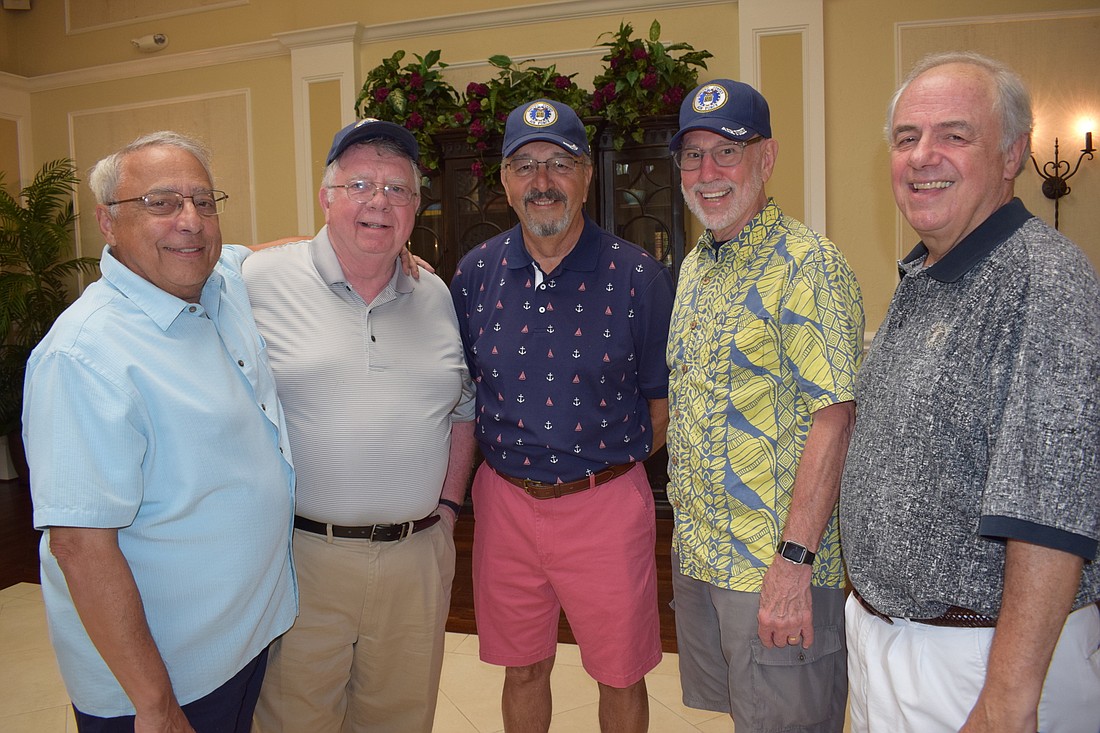- April 26, 2024
-
-
Loading

Loading

Although they sometimes carried radioactive material in luggage during their Vietnam-era service, five Air Force veterans chose to talk about things they deemed more important during their annual reunion last week.
Like softball.
Palm Aire's Carmen Valenti hosted their 15th consecutive reunion this year and during a Feb. 26 lunch at Palm Aire Country Club, they all agreed their camaraderie, which developed through their participation in sports on their base such as softball and football, sustained them through a difficult period of their lives.
None of the five men — Palm Aire's Valenti and Mike Gilbert, Cleveland's Jack Hanley, Crystal Lake, Ill.'s Bob Teiken and Syracuse, N.Y.'s Richard Duda — was deployed to Vietnam. That doesn't mean they weren't serving under intense circumstances.
There were stationed at McClellan Air Force Base in Sacramento, Calif.,, which closed in 1995 and is now a Coast Guard Air Station. Seemingly far away from the action, they intermixed with a community where many of the residents were not thrilled about men in uniform. Riots raged around the state in opposition to the war, and the soldiers, who all finished their service as sergeants, just hoped they could keep their families safe.
Meanwhile, they had a top secret job to do. As Valenti said, they didn't even exist on paper in terms of being soldiers.
Their assignment was nuclear detection. When a nuclear bomb was tested anywhere in the world, by allies or enemies, they handled the administration needed to send a pilot to that area of the world to collect air samples above the bomb site. Those samples were returned to McClellan Air Force Base and the soldiers would then make sure those samples were sent to labs around the U.S to be tested. Often they would deliver the samples themselves.
"It changed our lives," Duda said of their role during wartime. "These are the best friends I have. We had all just gotten out of college and we were starting families. We worked together and we couldn't tell our spouses about our mission. Besides Vietnam, this was a cold war and we were worrying about nuclear weapons. We kept touch with what the other countries were doing. We felt we had an important mission."
Everything they did outside the realm of recreation was classified. If they traveled to deliver test samples to labs throughout the country, they wore civilian clothes and carried the samples in a suitcase lined with lead which they kept with them at all times. If airport security wanted to take a look inside a suitcase as they were boarding a plane, they needed to decline and to get the security officers to call a special number to verify their mission. This at times would hold up takeoff for more than an hour.
Sometimes they carried fake orders with them to throw off anyone meaning to do them harm.
Their happy place was on athletic fields where the five participated on a team that won the base flag football championship and on softball teams that dominated on a base that hosted thousands of soldiers.
If they couldn't talk about their mission, they could freely discuss sports.
When he first arrived at McClellan, Hanley said Duda already was there and he invited him to his house, then asked him to join the softball team. The soldiers selected to participate in nuclear detection went through a stringent interview process and then two weeks of psychological testing and background checks. To say the least, they were on edge when they arrived at the base.
Teiken admitted the process seemed odd, and he worried about the background checks."But I I knew I didn't do anything bad," he said with a laugh. "I didn't know how deep they were going."
Softball and football normalized their life.
"We did our bonding over softball," he said of his fellow soldiers. "These were all good guys, and we were all there to serve. You know, I made the most enduring friendships of my life on that base. We all had the same life experiences."
Gilbert said the five all shared one thing in common, "We were all (smart alecks)," he said. "We all had thick skin. We were married guys living among the general population that wasn't happy if you were in the military."
They said they couldn't fill up at the gas station without being looked at suspiciously.
The five said they live now in a much different world. When they meet at their reunions, they encounter people who tell them the same thing when they speak about their days in the military.
"Thank you for your service."